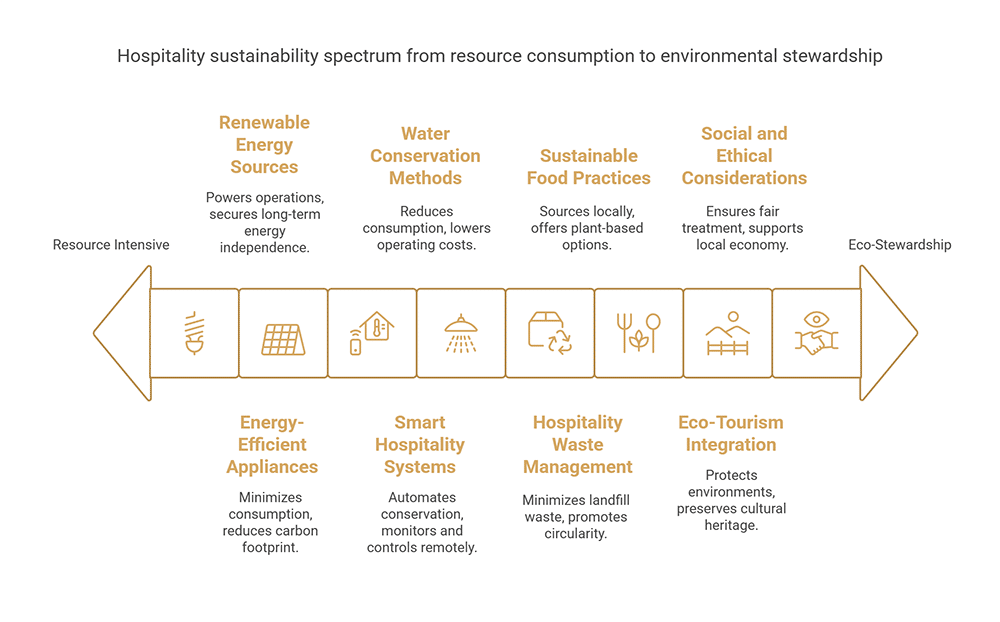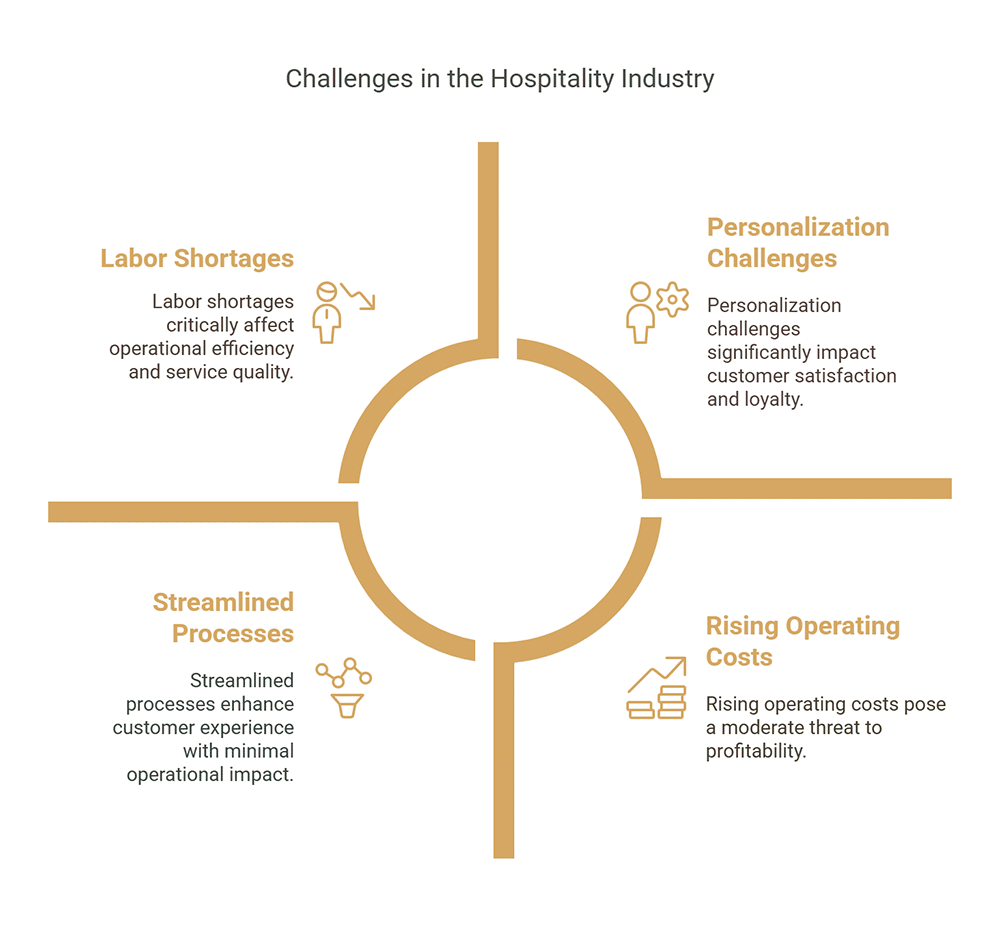The hospitality industry is generally recognized as a section of the wider service industry, focusing on leisure rather than more basic needs. In this article, you will learn more about the nature of the hospitality industry, its various sectors, and its connections to the hotel and travel industries.
Table of Contents:
- What is the Hospitality Industry?
- The Difference Between the Hospitality Industry and the Travel Industry
- Sectors Within the Hospitality Industry
- The Latest Hospitality Trends
- Technology Trends in the Hospitality Industry
- Hospitality Marketing
- Revenue Management in the Hospitality Industry
- Find Travel Agencies to Generate More Bookings in the Hospitality Industry
- Hospitality Management
- Different Management Types Within the Hospitality Industry
- Sustainability in Hospitality
- Challenges in the Hospitality Industry
- The Economic Impact of Hospitality
- An Overview of Different Hospitality Careers
- Channels for Finding Hospitality Jobs
- Tips for Advancing Hospitality Management Careers
- Hospitality Management Jobs Offered By Hotel Chains
- Job Boards for Finding Hospitality Manager Jobs
- Hospitality Course: An Overview of Hospitality Industry Education
- Free Online Revenue Management & Marketing Guide for Hotels
- A Breakdown of the Key Hospitality Services
- Other Related Industries
What Is the Hospitality Industry?
So, what is the Hospitality industry? First, defining what we mean by the hospitality industry is important. After all, it is a broad field. While most people have a basic idea of the types of businesses that count as hospitality brands, a far smaller number can provide a coherent and satisfactory explanation of what the industry is and is not.
The hospitality industry refers to various businesses and services linked to leisure and customer satisfaction. A defining aspect of the hospitality industry is that it focuses on ideas of luxury, pleasure, enjoyment, and experiences instead of catering to necessities and essentials. According to the Hospitality Global Market Report by Research and Markets, the global hospitality market is expected to reach $5.816 billion in 2027.
Video: Hospitality Industry Definition
The Difference Between the Hospitality Industry and the Travel Industry
The hospitality and travel industries are closely connected, but there are also some subtle differences to be aware of. On a basic level, the travel or tourism industry is concerned with services for people who have traveled away from their usual residence for a relatively short period.
By contrast, the hospitality industry is concerned with leisure and customer satisfaction services. This may well mean offering services to tourists. Still, it can also include providing services to people who are not tourists, such as locals enjoying their free time or people coming to an area for reasons other than tourism.
Table: Difference Between Hospitality and Travel Industry
Sectors Within the Hospitality Industry
See below the key sectors within the hospitality industry.
1) Accommodation
The accommodation sector of the hospitality industry is concerned with providing customers with a place to stay temporarily. It is most commonly associated with the tourism industry, where people book holidays or trips and require lodgings.
According to the Skift report, the global accommodation market, valued at $1.2 trillion, is projected to reach $1.3 trillion by 2026. Still, the accommodation sector also caters to locals seeking a short break from their everyday routine or those who require temporary accommodation for almost any other purpose.
Bed & Breakfasts
Bed & breakfasts, or B&Bs, are small establishments offering overnight stays and breakfast in the morning. Most B&B owners live on the property, while guests are provided with a private room and, in most cases, will also have a private or en suite bathroom. However, bathroom facilities are sometimes shared. According to the Mordor Intelligence report, the global B&B market is currently valued at around $32.16 billion and is forecast to reach USD 41.50 billion by 2030 at a 5.2% CAGR over the period.
Hotels
Arguably the most obvious form of accommodation in the hospitality industry, hotels cater to people who require overnight or longer-term stays. Hotels dominate with about 18.5 million hotel rooms globally.
Big hotel chains are leading the way. For example, Marriott International operates 8,785 properties across 139 countries, while Hilton has 7,530 properties in 123 countries.
Aside from offering lodgings, they tend to provide various other services, including room service, housekeeping, and facilities for eating and drinking.
Motels
Motels are similar to hotels but are specifically designed for overnight accommodation by motorists. With this in mind, they are generally situated at the roadside and will have free car parking facilities. Unlike hotels, however, motels usually offer little in the way of additional services or amenities.
Hostels
Hostels are communal accommodations where multiple guests usually sleep in a shared room, with guests renting a bed effectively. Bathroom and kitchen facilities are usually shared, and hostels offer less privacy than hotels. Yet, they are usually significantly cheaper, making them a solid option for those with a low budget.
Resorts
A resort is similar to a hotel but will provide a wider range of facilities and amenities. This means that guests can access sleeping facilities, food and drink facilities, entertainment facilities, shopping facilities, and other amenities without needing to leave the resort. Many resorts also offer all-inclusive pricing.
Serviced Apartments
Another form of accommodation that shares similarities with hotels is that serviced apartments are self-contained units supplied for either short-term or long-term stays. According to Future Market Insights, more than 60% of business travellers prefer apartments because they provide the comfort and amenities of hotels, and most of them are near business complexes. These apartments will typically be fully furnished, contain a kitchen, and may include various hotel-like services, such as laundry and cleaning.
Time Sharing
Finally, time-shared accommodation is where ownership or usage rights are shared between multiple people. It may be a house, condo, or similar type of property, and each owner will typically be allocated a particular time of the year when they will have the right to use it.
2) Food & Drinks
While food and drinks are necessities, most food and drink services also fall under the hospitality industry umbrella because they offer people a way of spending their leisure time and disposable income, and an opportunity to socialize and enjoy an experience. According to EHL Insights, the food and beverage sector represents about 30-50% of total hotel revenues. Again, the food and drinks sector caters to many customers, including tourists, locals, ex-pats, and passers-by.
Restaurants
Restaurants provide customers with food and drink services, with the food either being eaten in the establishment or taken away for consumption. According to the National Restaurant Association report, restaurant industry sales are expected to reach $1.2 trillion by 2030. This section of the hospitality industry includes fine dining restaurants, takeaway restaurants, fast food restaurants, and a variety of other restaurant types.
Catering
Catering services are food services provided within a particular site or in a more remote location, where food and drink are not necessarily the main service. Examples include catering provided at parks, arenas, stadiums, hotels, event venues, and certain forms of public transport.
Bars & Cafés
Bars and cafés offer customers options to socialize and enjoy food and drinks. They also tend to be a more casual option than most sit-in restaurants. Cafés generally focus on coffee, tea, and light snacks, while bars tend to prioritize alcoholic drinks and soft drinks and may also offer additional entertainment.
Nightclubs
Nightclubs are one of the main ways the hospitality industry caters to people searching for nighttime entertainment. They serve alcoholic drinks, are kept open until late, and often emphasize music and dancing. Many nightclubs have specific themes, and they may cater to locals, visitors, or tourists.
Tea & Coffee Shops
Tea rooms and coffee shops provide a similar function to cafés, primarily serving varieties of tea and coffee, as the name suggests. With that being said, tea and coffee shops are often individual rooms within larger buildings, such as hotels, and they may also sell products to be taken away, such as tea bags and coffee beans.
3) Travel and Tourism
It is important to understand that the hospitality and travel industries are closely linked. Many of the services that are classed as travel industry offerings are also hospitality offerings because they are linked to leisure, customer satisfaction, pleasure, experiences, and disposable income. Importantly, the crossover between the tourism and hospitality industries centers on services rather than end products.
Travel Agents
Essentially, travel agents serve to sell travel products to customers on behalf of suppliers. They will often receive a commission for successful sales and can be a convenient option for inexperienced travelers, providing them with advice on the best travel products for their particular needs.
According to IATA’s Global Passenger Survey, 71% of travelers now prefer booking their trips online or through mobile apps. About 53% choose to book directly through airline websites or apps. This shows a clear shift toward technology-driven travel experiences.
Tour Operators
A tour operator offers a combination of travel and tour products, combining them into a package, which is then sold to customers. This might, for instance, include travel to a destination, transfers from a hotel or train station to a hotel, as well as several trips, activities, or experiences throughout the customer’s stay.
Online Travel Agencies (OTAs)
Online travel agents perform many of the same functions as traditional travel agents, albeit over the Internet. OTAs are now controlling more than 50% of hotel bookings. However, using online platforms means customers often have access to a greater level of self-service, with the OTAs helping users search for the travel products that best suit their requirements. According to Companies Market Cap, Booking Holding is the largest travel company at a market cap of $130.4 billion in 2024.
Cruises
Cruises are voyages on cruise ships undertaken for pleasure rather than transportation. A cruise may have various stops, but passengers will spend most of their time aboard the ship, providing them with lodgings, entertainment, catering, and more.
Car Rental
Car rental services cater to customers who require short-term access to a car. In many cases, these services are used by tourists traveling to other parts of the world. However, some locals may also wish to rent a car, especially if they do not have regular access to one or if they require a larger number of passenger seats.
Casinos
Finally, a casino is an entertainment establishment that provides customers with opportunities to gamble. These gambling opportunities are predominantly offered via luck-based games. In addition to the gambling component, many casinos also stage live performances, offer food and drinks, and are connected to hotels.
The Latest Hospitality Trends
It is important for businesses operating within the hospitality industry to keep up with the latest hospitality trends to avoid being left behind. Furthermore, keeping pace with the wider industry is one way owners can help ensure their business delivers an excellent customer experience. According to Phocuswright’s Travel Trends Report, 89% of travel executives expect AI to deliver meaningful business impact within three years.
In the article “Hospitality Trends: The Latest Trends in The Hospitality Industry,” you can find the latest hospitality trends.
Hospitality Technology Trends
As in every industry, technology is also becoming tremendously important within the hospitality industry. It helps companies operating in the industry to innovate processes and customer experiences. Furthermore, guests are used to various technologies at home, so they also expect at least the same level when they are on holiday.
Keeping up with the latest technology is essential because the industry is extremely competitive. In the article “The Latest Technology Trends in the Hospitality Industry,” hospitality companies should know about the latest technology trends.
Hospitality Marketing Trends
Introducing the most effective hospitality marketing tools to your business is essential for attracting new customers and increasing your brand’s reputation. Marketing your business through digital platforms is a powerful way to gain maximum exposure.
Knowing how users plan and book their accommodations and tours online will help you utilize the most powerful marketing strategies. Hotels that adopt data-driven and guest-focused marketing approaches have seen the average number of annual visits per guest increase from 1.3 to 4.6, while length of stay has grown from 1.9 to 3.2 nights.
In the article “Latest Hospitality Marketing Trends” you will find the latest hospitality marketing trends.
The Relevance of Revenue Management for The Hotel and Hospitality Industry
Every industry is competitive, and the hospitality industry is no different. An effective revenue management strategy can help to maximize profits, not just for the hotel sector but also for resorts, cruises, restaurants, casinos, and any other hospitality sector.
Revenue management utilizes a revenue optimization method that helps businesses in the hotel and hospitality industry exploit their full potential for higher profitability. According to the latest Duetto Revenue Management Trends & Predictions Survey, hoteliers now rank revenue management 4.8 out of 5 in terms of importance to their business.
Bill Marriott Jr., Chairman and CEO, Marriott International, noted,
“Revenue management has contributed millions to the bottom line, and it has educated our people to manage their business more effectively. When you focus on the bottom line, your company grows.”
Learn about the definition of revenue management and its importance in this article, ‘Revenue Management; clearly explained!’.
Find Travel Agencies to Generate More Bookings in the Hospitality Industry
People often turn to travel agencies for travel products or services online rather than visiting individual company websites. For this reason, the hospitality industry can potentially benefit from linking to a travel agency platform because the agency will be able to generate incremental bookings for you.
Read “Find Travel Agencies to Generate More Bookings,” and you will have access to a list of the main travel agencies to partner with and further information about why working with travel agencies is so important.
Hospitality Management
Hospitality is an industry that includes restaurants, hotels, casinos, amusement parks, events, cruises, entertainment, and other tourism-related services. As such, this industry isn’t just important to businesses but also to customers, employees, and economies.
Providing customers with excellent service is the primary goal of hospitality managers as they focus on creating high-standard services and environments to make their customers feel welcome at their establishments. With 65% of hotels reporting staffing shortages and wages reaching a record $23.91/hour, effective management is necessary.
‘Hospitality Management: The Essentials About Hospitality’ is a comprehensive guide that explains how to kick-start your career in the hospitality sector.
Different Management Types Within the Hospitality Industry
Within the hospitality industry, there are several different management types to be aware of. In the sections below, you can find out what each role entails.
Restaurant Management
Restaurant management is the management of businesses or departments within the hospitality industry that allow customers to order and eat food on-site. It involves overseeing the day-to-day management of the business or department, managing employees, tracking and maintaining stock levels, managing reputation, and more.
Check out “Restaurant Management: Everything You Need to Know” for more on how restaurant management is defined, the core duties associated with the role, the qualities needed to succeed, and the value of the role.
Travel Management
Within the hospitality industry, travel management refers to the specialism of organizing and managing business travel. Typical tasks can include tracking expenditures, optimizing travel routes, booking flights and hotel stays, and devising strategies to minimize the negative impact of business travel on productivity, morale, and company finances.
Take a look at the “What is Travel Management?” article for an in-depth overview of travel management as a discipline, complete with a breakdown of the most important tasks, an evaluation of the benefits of travel management, and insights into the differences between in-house travel management and the use of a travel management company.
Hotel Management
Hotel management refers to hotels and similar businesses operating in the hospitality industry. Generally, hotel managers oversee daily operations, supervise departments when necessary, manage employees, recruit new staff, provide training, devise strategies, and more.
Read “Hotel Management: Everything You Need to Know About Managing a Hotel” for a more detailed analysis of the role of the hotel manager, the importance of effective management, and the core duties.
Sustainability in Hospitality
Sustainability in the hospitality industry is increasingly important in an age where eco-conscious travelers are more prevalent and influential than ever. Explore some of the key strategies and approaches:
Energy-Efficient Appliances
Energy-efficient appliances are designed to consume less power than regular appliances. Some of the most common examples include LED lighting, smart thermostats, and energy-efficient heating systems or cooking appliances. For those in the hospitality industry, energy efficiency is becoming a bigger priority, as a growing number of guests are concerned about environmental harm. Additionally, energy-efficient appliances reduce energy costs.
By researching and investing in energy-efficient lighting, HVAC systems, and other electronics, you can lower your carbon footprint by reducing the overall amount of energy you use. This can provide opportunities to highlight your green credentials within marketing and can help you to appeal to eco-conscious travelers. With the right investment, it is not uncommon to be able to cut electricity costs by 30% or more. Over months and years, this can lead to substantial savings that can be reinvested elsewhere.
A leading example is the Hampton Inn & Suites, which reduced its electricity bills by approximately 40% after installing a photovoltaic (solar) array. This move not only cut costs but also made it the first Hampton Inn & Suites to earn the U.S. Green Building Council’s certification for sustainable buildings.
Renewable Energy Sources
Renewable energy sources are sources of energy that naturally replenish, with examples including wind, sunlight, water, and biomass. Businesses in the hospitality industry can use these sources to partially or fully power appliances. Hospitality leaders are investing in renewable energy because it can help to lower energy costs and reduce carbon emissions. At the same time, these energy sources can also offer greater long-term energy security.
The main alternative to renewable energy is to use fossil fuels, which are being rapidly depleted and which release carbon dioxide into the atmosphere. Through options like solar panels, you can reduce your reliance on this process. Using renewable energy sources can help to protect your business from fluctuating energy prices and will help you to attract tourists who are concerned about the environment. This demonstrates how the approach can be both ethical and business-savvy.
Some examples of major brands using renewable energy include Six Senses and IHG Hotels. Hilton has also made significant strides in this area. Its Environmental, Social, and Governance (ESG) Report highlights a 44% reduction in carbon emissions per square meter since 2008, largely driven by renewable energy adoption and energy efficiency initiatives.
Artificial Intelligence
Artificial intelligence plays several roles within the hospitality industry, but the main one is improving customer service. One example is AI-powered chatbots, which can be used for online customer interactions, removing lengthy waiting times and providing swift, intelligent responses to questions. According to the AI in Hospitality Market by We Market Research, the global AI in hospitality market is projected to grow at a CAGR of 60% until 2033.
However, there are additional uses for artificial intelligence technology, too. For instance, some hotels have introduced AI and voice-controlled customer service or tourist information hubs within their hotels. Meanwhile, AI can also sort through data, automatically adjust processes, etc.
Smart Hospitality Systems
Smart hospitality systems are integrated systems, which are generally capable of some degree of automation. They will make use of sensors, automated functions, and centralized control systems to improve efficiency. When it comes to sustainability in the hospitality industry, smart systems are important for reducing unnecessary energy usage. These systems can often automatically turn off when they are not needed, saving money and resources. According to Smart Hospitality Market – Industry Trends & Forecast, the global smart hospitality market is projected to reach $49.9 billion by 2027 at a CAGR of 29.8%.
For example, a smart heating system can detect when the temperature has reached the pre-defined level and automatically lower the temperature to keep the conditions stable. A smart lighting system can automatically turn off when the levels of light in the room reach a certain level and can automatically dim when full power is not required. Many hotels now use technology that allows conditions in guest rooms to be monitored and controlled remotely, too. This not only allows devices to be turned off when rooms are vacant, but can also provide valuable usage data.
Water Conservation Methods
In recent times, there has been a greater focus throughout the hospitality industry on water conservation. Examples include switching out baths for showers, using systems to collect and re-use rainwater, and using low-flow water systems. Water conservation is a concern for the hospitality industry as a whole, as it faces growing scrutiny over natural resource consumption. By taking steps to reduce usage, businesses can stand out from rivals.
Industry leaders in the hotel sector are using technology like flow regulators to save millions of gallons of water each year. Some are also using systems to clean and re-use shower and sink water for flushing toilets. For example, industry leaders like Marriott saved 14.7% water intensity while Hilton reduced consumption by 33.4% through comprehensive programs.
While the environmental concerns are the key drivers behind many water consumption strategies, it is also worth noting that restaurants, hotels, and other businesses can also significantly reduce operating costs this way, too.
Hospitality Waste Management
There are a variety of waste management strategies that can be deployed in the hospitality industry to minimize harm. More and more businesses are adopting the “reduce, reuse, recycle” mantra to inform choices. This is vital because waste contributes significantly to the climate crisis, especially when it ends up in landfills or incinerators. By limiting waste as much as possible, businesses become more sustainable.
In practice, this means reducing the amount of single-use plastics used within your business, encouraging employees and guests to recycle, and using techniques like food waste composting to reduce landfill waste. Strategies like digital billing can help you achieve an easy win when it comes to reducing paper waste. In the best cases, some hospitality industry leaders have managed to divert more than 80% of waste away from landfill.
Sustainable Food Practices
Sustainable food practices are the various methods hospitality businesses can use to make food services more environmentally friendly. This can include sourcing from local suppliers and offering vegetarian or vegan options. There is a growing demand for ethical dining, so restaurants, hotels, and similar businesses are responding to this. By behaving more sustainably, the long-term viability of the hospitality industry increases.
A number of major hotel brands are now working more closely with local farmers to source fresh, local produce and reduce transportation in their supply chain. Additionally, hospitality businesses can reduce their carbon footprint by offering more plant-based options and reducing the number of meat-heavy options on their menus. Hotels, restaurants, cafes, and other hospitality businesses can also improve the sustainability of food services by offering smaller portions or more choices in terms of portion sizes. This limits the amount that is thrown away.
Eco-Tourism Integration
The integration of eco-tourism within the hospitality industry is based on the creation of experiences that protect natural environments. It also involves preserving cultural heritage and educating guests. Eco-tourism is essential for hospitality in places of cultural sensitivity or historical importance. It helps to prevent some of the harms associated with hospitality and travel, while still allowing people to experience these places. According to Booking.com research, more than half of travelers (53%) are now conscious of tourism’s impact on local communities, as well as the environment.
An important component of eco-tourism integration is the creation of jobs and opportunities for people in the local community. This not only benefits the region as a whole and provides economic growth, but it also gives local people a stake in your business. As a result, more internal voices are in touch with what the community wants. There are great examples of this around the world, including safari offerings that allow guests to experience wildlife up close, while providing guide jobs to local people and funding for animal conservation efforts.

Thom de Graaf and Kamila Zawadzka, The Orange Studio“A major trend that has gained momentum this year is personalised wellness. From nutrition to fitness, and mindfulness to sleep, consumers are increasingly seeking science-backed solutions to optimise their wellbeing and body for peak performance. By prioritising personalised wellness solutions and staying attuned to the latest trends and advancements, luxury hotels can not only meet but exceed the expectations of today’s health-conscious travellers. As travellers seek to escape the ordinary and embark on journeys of self-improvement, these hotels are poised to be their partners in wellness, offering tailored experiences that leave a lasting impression and foster a sense of wellbeing long after check-out.” Click here to learn more travel and tourism trends from our Expert Panel. |
Social and Ethical Considerations
Another key component of a more sustainable and viable hospitality industry is social and ethical consciousness. This includes fair treatment of workers, good relationships with the local community and ethical supply chains. Travelers and local communities are more aware than ever of the potential harms associated with the hospitality industry. Businesses that behave ethically and with a social awareness can gain reputational advantages.
The industry leaders carry out detailed investigations of their supply chain and sign up to codes of conduct that ensure fair working conditions throughout. There is a greater focus on buying from local suppliers, when possible, as this reduces CO2 emissions, supports the local community and ensures they benefit from your business success. It can also be a good idea to implement local hiring quotas, so the community experiences clear economic benefits. Where possible, hospitality businesses should support local charities and education too.
Challenges in the Hospitality Industry
Businesses operating in the hospitality industry also face a number of challenges that need to be overcome to enjoy lasting success and profitability:
Operational and Financial Challenges
Operational and financial challenges are the obstacles that hospitality industry businesses must overcome to be profitable. They include labor shortages, contending with seasonal fluctuations, and dealing with rising operating costs.
According to a survey by the AHLA and Hireology, 65% of hotels reported ongoing staff shortages. Moreover, 71% of hotels said they had unfilled job openings despite active recruitment, with each property trying to fill an average of six to seven positions. The hardest-to-fill roles are in housekeeping (38%), followed by front desk staff (26%), culinary positions (14%), and maintenance jobs (13%).
Adam Robinson, CEO of Hireology, explains:
“The hospitality industry faces a dual challenge—severe staffing shortages, especially in essential roles like housekeeping and front desk, along with the need to retain current employees. While wage hikes and other initiatives help, true progress requires focusing on career growth and clear advancement pathways to attract and keep talent.”
Overcoming these challenges is critical for survival and growth. It is crucial for hospitality industry leaders to find new ways to attract talent, especially in an age where many job roles offer work-from-home benefits. Options may include flexible working hours, career progression and training opportunities, and opportunities to travel as part of the job. Financial challenges can often be dealt with by diversifying revenue and by maximizing bookings. Possible methods include using OTAs to increase your reach and offering ancillary services to earn more revenue.
Customer-Related Challenges
There are a variety of customer-related challenges in the hospitality industry, often revolving around changing customer expectations. Businesses must continually adapt and meet these expectations. It is essential to continually change your offerings to meet what customers demand and what other businesses are providing. It is also important to develop customer loyalty by offering excellent service time and time again.
One of the biggest challenges related to customers is delivering a level of personalization. Customers want to feel valued as individuals, and this means using your CRM software to understand their preferences and deliver on their needs. It does present clear operational hurdles to clear, however, especially when dealing with a large number of guests. Customers also want streamlined processes, such as contactless check-ins and self-service offerings. However, hotels, bars, restaurants, and other hospitality businesses need to deliver this while retaining a human touch.
Technology and Digital Challenges
One of the biggest challenges the industry needs to get to grips with is the implementation of new technology. Examples range from virtual reality tours in booking engines to AI-powered analytics tools. Failing to implement the right technology can disappoint customers and leave your business with inefficiencies. It can also result in competitors gaining a significant advantage if they implement technology and you do not.
Hospitality industry leaders need to strike the right balance, improving efficiency and the guest experience at a reasonable price. This means prioritizing investment in the areas offering the greatest return on investment. According to a Skift hospitality report, 65% of hoteliers said adopting new technologies is their primary strategy to manage staff shortages, attract new employees, and guests.
A key area of priority right now is AI-powered digital technology that can automate repetitive tasks, freeing up your workforce to focus on meeting customer needs. Meanwhile, in-room devices powered by the Internet of Things can provide smart controls, allowing guests to customize their own guest experience.
At the same time, robotics is beginning to play a larger role. According to MRFR analysis, the hospitality robot sector could grow from $24.38 billion in 2025 to more than $107 billion by 2034, representing an impressive CAGR of nearly 18%. These machines are already being tested for cleaning, delivery, and concierge services, particularly in regions facing labor challenges.
The Economic Impact of Hospitality
The hospitality industry has a significant impact on local, regional, and national economies. By understanding and tracking key metrics, the full extent of this impact can be understood:
Global Market Size and Growth Projections
Global market size and growth projections measure the total hospitality industry footprint and the expected level of growth over time. According to Mordor Intelligence, the U.S. hospitality sector was projected to reach approximately $247.45 billion in 2025 and grow to $313.87 billion by 2030, with a projected CAGR of 4.87% between those years.
A particular focus is placed on revenue earned by businesses in the industry. These metrics are indicative of the current status of the hospitality industry and can be used to inform strategic decision-making. They can also help to understand regional fluctuations in demand for hospitality services.
For example, in the aftermath of the COVID-19 pandemic, growth projections were important for understanding how the industry would bounce back from travel restrictions and forced closures. At the same time, global market size metrics also helped to contextualize the extent of the damage done to the industry by lockdowns. By monitoring these metrics, you can also strategically target your marketing efforts in the right areas. For example, it makes sense to invest heavily in areas experiencing growth in demand for hospitality services.
Employment and Job Creation Statistics
Employment and job creation statistics help to highlight the level of workforce participation in the hospitality industry. According to the World Travel & Tourism Council, the hospitality sector has supported more than 357 million jobs worldwide, with that number expected to reach 449 million by 2034.
Such metrics can also indicate the number of jobs being made and earnings trends over time. These are vital indicators of the economic health of the hospitality industry and the number of opportunities available. This can also help to indicate the level of competition that will exist when hiring workers.
As new technology emerges, employment and job creation statistics are gaining a new level of intrigue, as they can highlight the impact that AI and automation are having on employment in the industry. Tracking employment metrics can also help to highlight how seasonal fluctuations impact jobs and workers. Furthermore, these statistics can help to indicate the demographics working within hospitality. This, in turn, can help to show how inclusive the industry is and the age groups that are represented.
Regional Variations in Hospitality Markets
Within the hospitality industry, there is significant regional variation in areas like revenue, consumer behavior, economic benefits, pricing, and standards of service. Tracking these variations over time demonstrates regional shifts. This is important for highlighting investment opportunities in different areas. It also allows businesses to make strategic decisions based on the specific trends in their region, rather than less relevant wider trends.
There are significant trends associated with different regions of the world, like the emergence of large-scale hospitality developments and luxury hotels in the Middle East and the increased use of robotics technology in Japan. Understanding these trends can be useful for seeing possible future trends in other parts of the world, too. Understanding the specific trends and conditions in your part of the world is also essential for remaining competitive. It allows you to position your business strategically, with an understanding of what others nearby are doing.
An Overview of Different Hospitality Careers
The hospitality industry is so diverse that those seeking hospitality careers have many different job roles to choose from. Whether you want to work in food and drinks service, a front office position, cleaning and maintenance, or a managerial role, it is vital to understand the options available.
Read “An Overview of Different Hospitality Careers” for a breakdown of the most common and important hospitality positions that are available, complete with a description of what each job actually entails.
Channels for Finding Hospitality Jobs
Employers in the hospitality industry advertise vacancies on several different platforms and channels. For this reason, if you are seeking hospitality jobs, you must combine these channels to avoid missing out on the ideal opportunity for your skill set and personal preferences.
Check out “Channels for Finding Hospitality Jobs” for an overview of some of the most popular and important channels to find and apply for jobs online, including hospitality job boards, social media sites, recruitment agencies, and hotel websites.
Tips for Advancing Hospitality Management Careers
The hospitality industry is competitive by its very nature, and demand for hospitality management careers can be especially high. Whether you are looking to become a general or hotel manager, or the manager of a specific department, there are certain things you can do to maximize your chances of landing the role of your dreams.
Read “Tips for Advancing Hospitality Management Careers” and find a list of 10 tips that can help you find the right role, improve the quality of your application, and perform well in the interview.
Hospitality Management Jobs Offered By Hotel Chains
Within the hospitality industry, some of the biggest employers are major hotel chains, especially those that operate globally. These businesses offer several different types of hospitality management jobs and often advertise vacancies on their corporate websites, so it can be important to check those regularly.
In the article “Hospitality Management Jobs Offered By Hotel Chains”, you can find out more about ten of the biggest hotel chains in the world and use the information to seek out senior management roles online.
Job Boards for Finding Hospitality Manager Jobs
Many people in the hospitality industry aspire to work in a managerial role. Still, for this to be possible, the first step involves knowing where to look for advertised vacancies. Job boards represent one of the most useful channels for anyone looking to become a hospitality manager.
In “Job Boards for Finding Hospitality Manager Jobs,” you will be able to gain insight into the role of a hospitality manager and also find examples of job boards that advertise senior hospitality positions.
Video: Want to be a Hospitality Manager? Watch this!
Hospitality Course: An Overview of Hospitality Industry Education
The hospitality industry offers many job roles, and while some are entry-level positions, others require more advanced skills and knowledge. This means that there may be some career options that will require you to take a hospitality course first. Fortunately, there is a diverse range of options to choose from.
If you want to learn more about the hospitality courses, what they cover, how they can benefit you, and where you can find them, read “Hospitality Course: An Overview of Courses & Hospitality Educators”.
Free Online Guide on Revenue Management & Marketing Strategies
Excellent facilities, first-class service, the most comfortable rooms, and a great location may all be the highlights of your hotel. Still, the question is, are your potential customers aware of these? Having a perfect hotel without anyone knowing about it is useless unless you use the most effective hotel marketing strategies.
The ’Free Guide: Revenue Management & Hotel Marketing Strategies’ will show you how to market your hotel business effectively by utilizing some important strategies.
A Breakdown of the Key Hospitality Services
It is important to understand that the hospitality industry is vast. Within the broad fields of accommodation, travel and tourism, and food and beverages, you have hospitality services as diverse as hotels, restaurants, museums, cafes, nightclubs, inns, B&Bs, hostels, members’ clubs, event destinations, and casinos.
In the “Hospitality Services: A Clear Overview of All Hospitality Services” article, you will learn about over 50 different services so you can expand or fine-tune your understanding of what hospitality really means.
Hospitality Industry FAQs
Ultimately, the hospitality industry should be classed as a section of the service industry that focuses on leisure and customer satisfaction rather than necessities and end products. It is a broad industry containing multiple sectors and a wide range of different businesses and products.
Want to Learn More About Related Industries?
The hospitality industry is part of the travel industry, and the hotel industry is part of the hospitality industry. All these industries have in common that they are large service industries worldwide and increasingly important in the modern age. But what is the difference between the travel and tourism industry? And what are all the hospitality sectors within the hospitality industry? In the following articles, you will learn more about related industries.
- Travel Industry; An Overview of One of the Largest Service Industries
- Hotel Industry; An Overview of All Different Types of Accommodations
- Tourism Industry; Everything You Need to Know About Tourism
- Restaurant Industry: Overview, Types, Examples, and More.
- What is the Difference Between the Travel and Tourism Industry?
- Airline Industry: All You Need to Know About The Airline Sector
- Aviation Industry: Everything You Need to Know About the Aviation Sector
- Everything You Need to Know About the Cruise Industry
- Space Tourism: Space Companies That Will Make You An Astronaut
More Tips to Grow Your Business
Revfine.com is the leading knowledge platform for the hospitality and travel industry. Professionals use our insights, strategies, and actionable tips to get inspired, optimize revenue, innovate processes, and improve customer experience.Explore expert advice on management, marketing, revenue management, operations, software, and technology in our dedicated Hotel, Hospitality, and Travel & Tourism categories.














Very educative and an opportunity for me to achieve my goals in the hospitality industry.
Superb, i learned a lot, thanks.
Nice, and great article about the hospitality industry.
Thank you so much for this amazing useful article about the hospitality industry, wish you the best and good luck.
Thank you for sharing this amazing information about hospitality & tourism.
Thank you for this amazing article! It has open up my mind about the hospitality industry.
Thank you for sharing this article about the hospitality industry, it has really helped me.
Thank you for all the information within this post about hospitality. Thanks a lot Revfine.
Thank you Revfine for the broad and superb information. It helped me a lot.
Local experience – people travel because they want to experience a life similar to their own, but in a different location and experience an authentic way of life in the location they visit.
Healthy and organic food – people have become more and more concerned about the health and they tend to eat more healthy food, more guests required gluten-free meals and more guest have special diets.
Sustainability – is widely regarded as the key to a successful business. Sustainability can continue to support life and provide resources to meet the needs of the present and future generations.
Personalization – it is an overused expression when it comes to customer experience in our digital age. Any business within the hospitality industry is built upon the principles of providing great personal service to the guest. A high-level level of personal service is achieved by well-trained staff. Additionally face to face could be replicated by a hotel’s digital personal concierge.
Artificial intelligence – AI, refers to the performance of seemingly intelligent behaviours by computers or machines. it is only in recent times that technology has advanced to the point where it can be considered reliable enough to deploy for important business tasks.
Essentially, AI refers to computers or machines carrying out tasks that were traditionally thought to require the cognitive function to carry out. It is associated with concepts like automation and big data.
You got my attention when you said that hotel accommodation falls within the hospitality industry. As you said, hotels offer various other services such as room service and housekeeping. My daughter once mentioned that she would like to work in hotels and establishments that cater to guest accommodation. It would make sense to me if I could find an online training session for her to help her with her career. Thanks for sharing this.
Hi Shammy, Great to hear you support your daughter with her career in hospitality :) In our article “Hospitality Course: An Overview of Courses & Hospitality Educators” you find a list of websites and educators with hospitality courses worldwide. Hope this helps.
Thank you so much for such an amazing article about the hospitality industry. I learned a lot!
Thank you for publishing an article about hospitality. As you said, the hospitality industry refers to a variety of businesses and services linked to leisure and customer satisfaction. By reading these articles I know more about what the hotel offers to guests. This article is very educative and an opportunity for me to achieve my goals in the hospitality industry.
Thank you for sharing this article with comprehensive information about hospitality. It is constructive.
Fantastic resource for anyone looking to explore the world of hospitality!